
Imagine turning your backyard into a colorful place where flowers bloom all year.
Pick a sunny spot, know your weather, and mix fast-growing flowers with ones that come back every spring. This helps your garden stay pretty and healthy.
Ready to grow your dream garden? Start with easy steps like choosing the right plants and watering them just enough.
Learn how to mix flowers that love the sun with those that prefer shade.
With simple tips, your yard can become a happy place for butterflies and you!
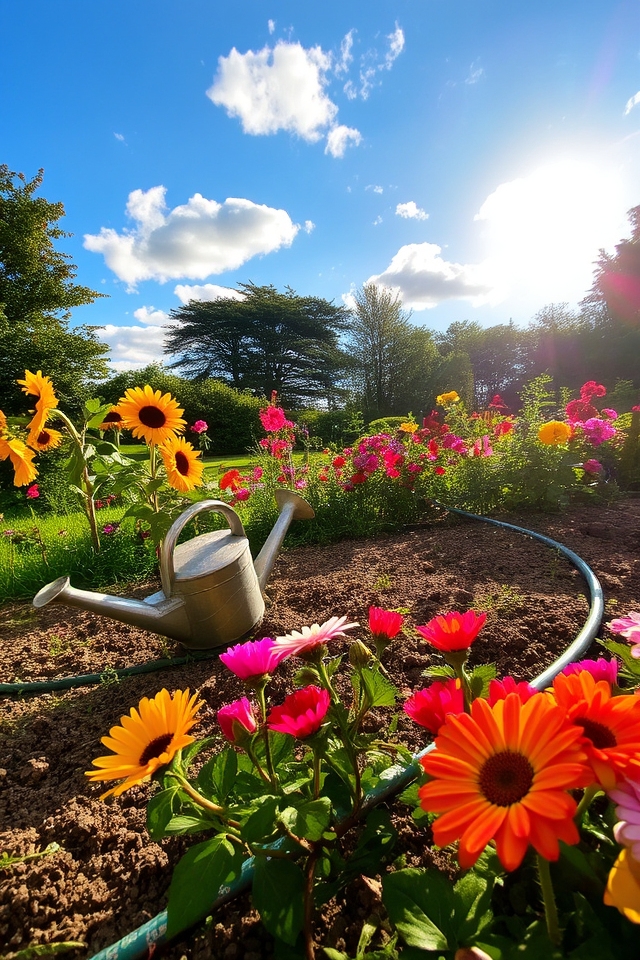
Choosing the right location for your flower garden is essential for its success. Ideally, select a spot that receives at least six hours of direct sunlight daily, as most flowering plants thrive in bright conditions. Additionally, consider proximity to water sources for easy irrigation and guarantee the soil is well-draining to prevent root rot. Observe the area throughout the day to note sun patterns and wind exposure, optimizing your garden’s health and growth.
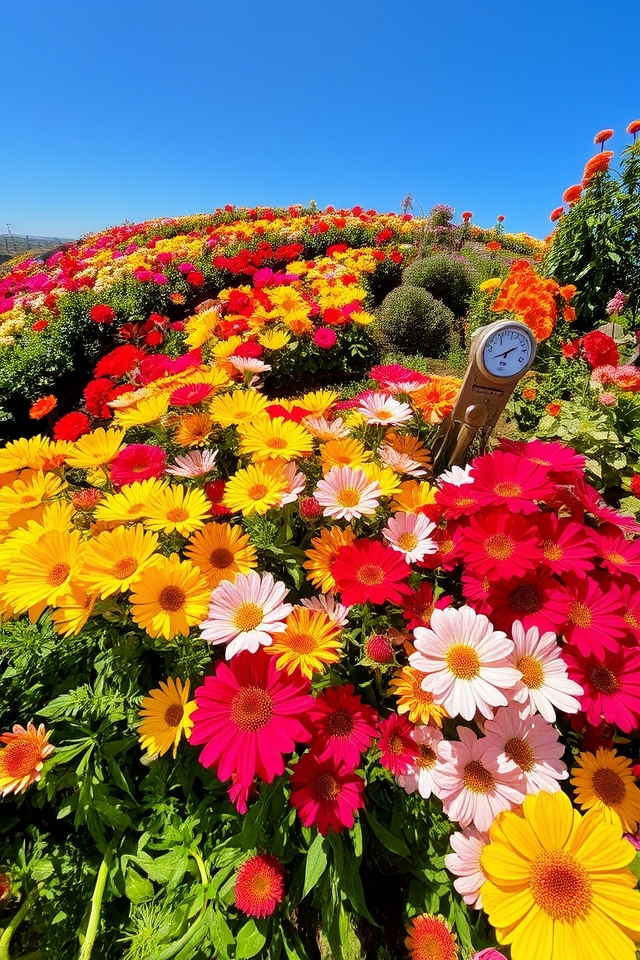
Understanding your climate zone is essential for successfully creating a flower garden at home. Climate zones determine the types of flowers that will thrive in your area, based on factors such as temperature, humidity, and seasonal changes. Consult the USDA Plant Hardiness Zone Map or local gardening resources to identify your zone. This knowledge helps you select flowers that are well-suited for your environment, ensuring a vibrant and flourishing garden year-round.
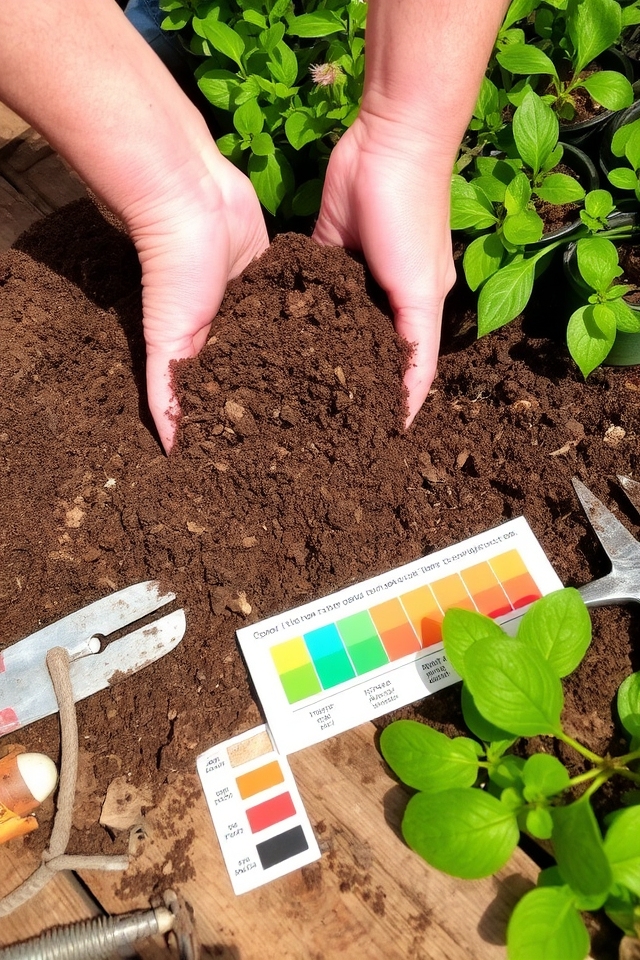
Selecting the right soil is vital for a thriving flower garden. Start with high-quality, well-draining soil that provides essential nutrients. A mix of loam, compost, and organic matter will promote healthy root development and moisture retention. Testing the soil’s pH is also important; many flowering plants prefer slightly acidic to neutral conditions. Amending the soil with appropriate fertilizers can further enhance its quality, ensuring your flowers receive the best possible start in their new home.
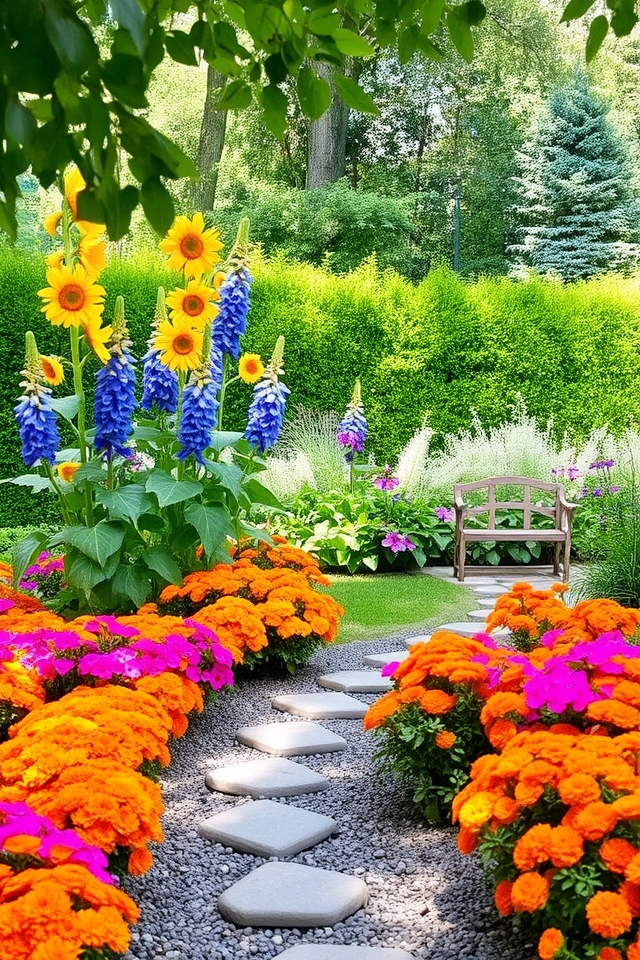
Planning your garden layout is an essential first step in creating a thriving flower garden at home. Begin by evaluating the sunlight and shade areas in your yard, as different flowers have varying light requirements. Sketch a simple design, considering plant heights and colors for visual appeal. Group taller plants at the back and shorter ones at the front to create depth. Don’t forget to include pathways for accessibility and maintenance. This thoughtful arrangement sets the foundation for a beautiful, flourishing garden.
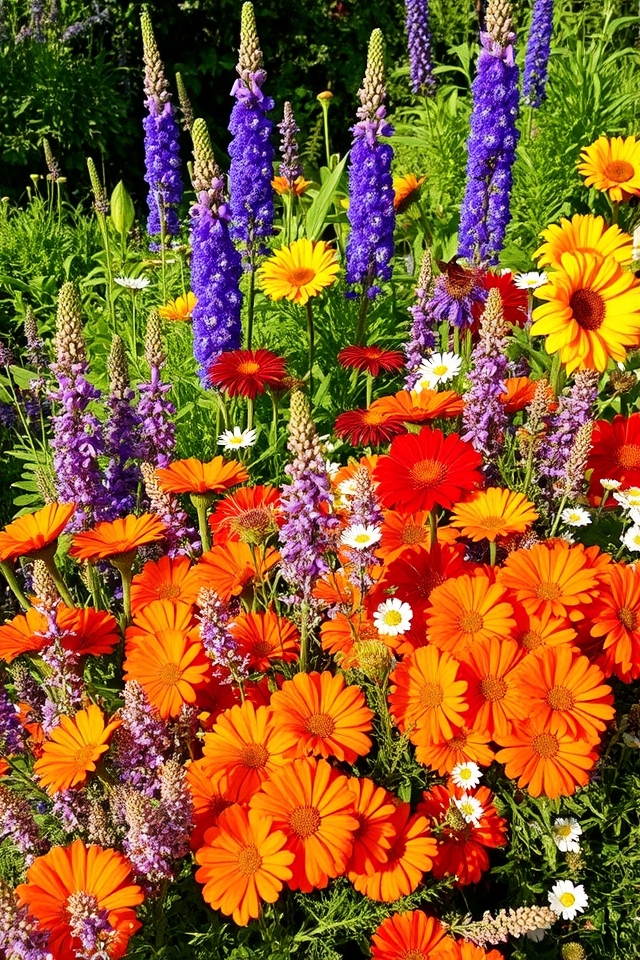
Choosing a diverse array of flowers is essential for a vibrant and visually appealing home garden. When selecting flowers, consider their colors, shapes, and blooming seasons to guarantee a continuous display throughout the year. Mixing annuals and perennials can add dynamic interest. Think about the growing conditions in your space; some flowers thrive in full sun, while others prefer partial shade. Don’t forget to include flowers that attract pollinators, enhancing both beauty and biodiversity.
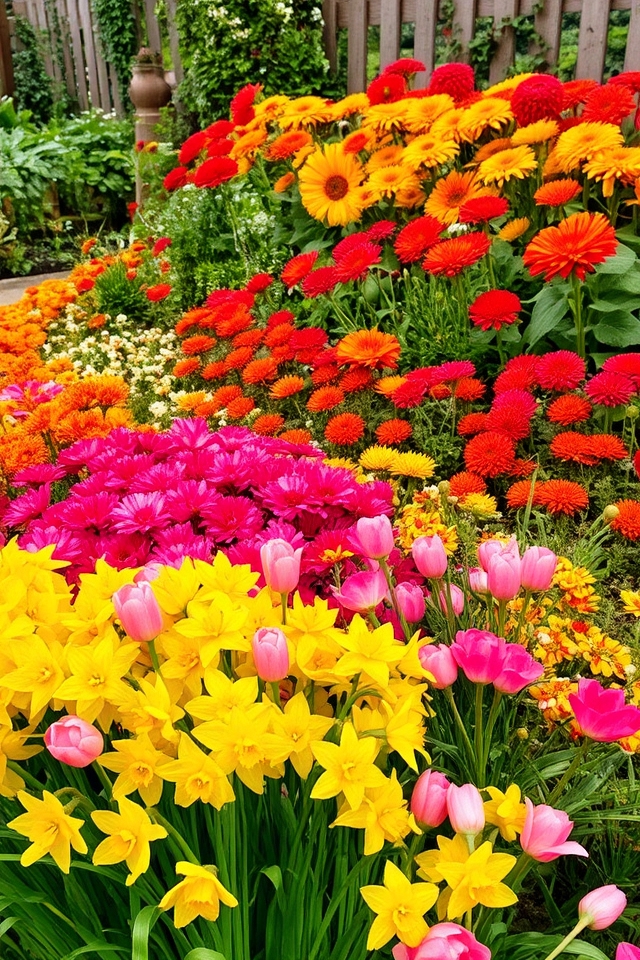
When creating a flower garden at home, it’s essential to take into account flowering seasons to guarantee continuous blooms throughout the year. Different flowers flourish in various seasons, so choose a mix of perennials and annuals that bloom in spring, summer, fall, and even winter. This strategic planning not only enhances the aesthetic appeal of your garden but also supports local pollinators by providing a consistent food source across the changing seasons.
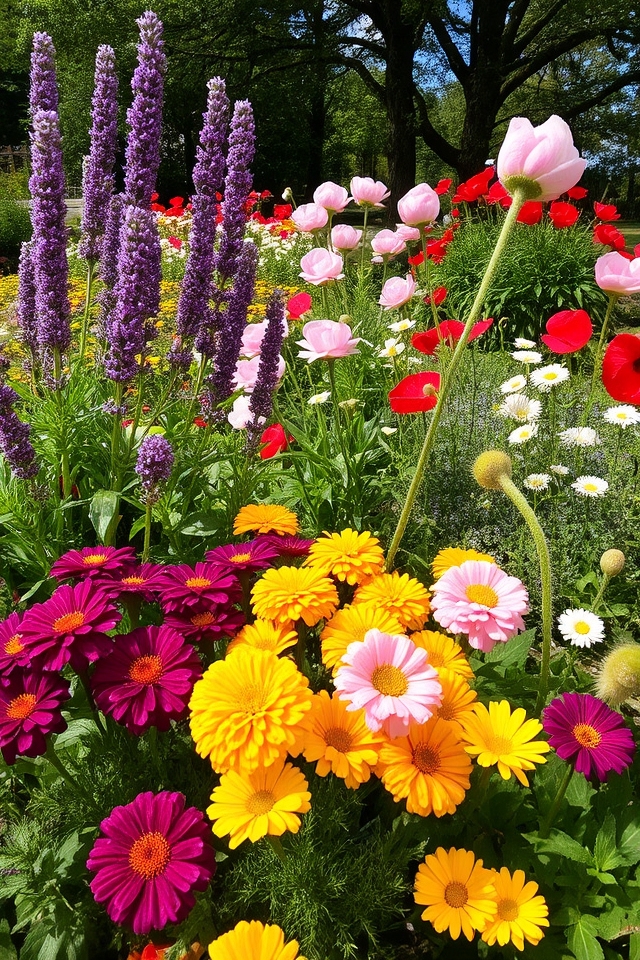
Incorporating both perennials and annuals is essential for a vibrant and diverse flower garden. Perennials, which return each year, provide a stable foundation with their enduring beauty, while annuals offer a burst of color and variety that changes seasonally. By mixing these types of flowers, you can achieve a garden that thrives throughout the year. Choose perennials for structure and longevity, and complement them with annuals to introduce fresh hues and textures, ensuring continuous blooms in your outdoor space.
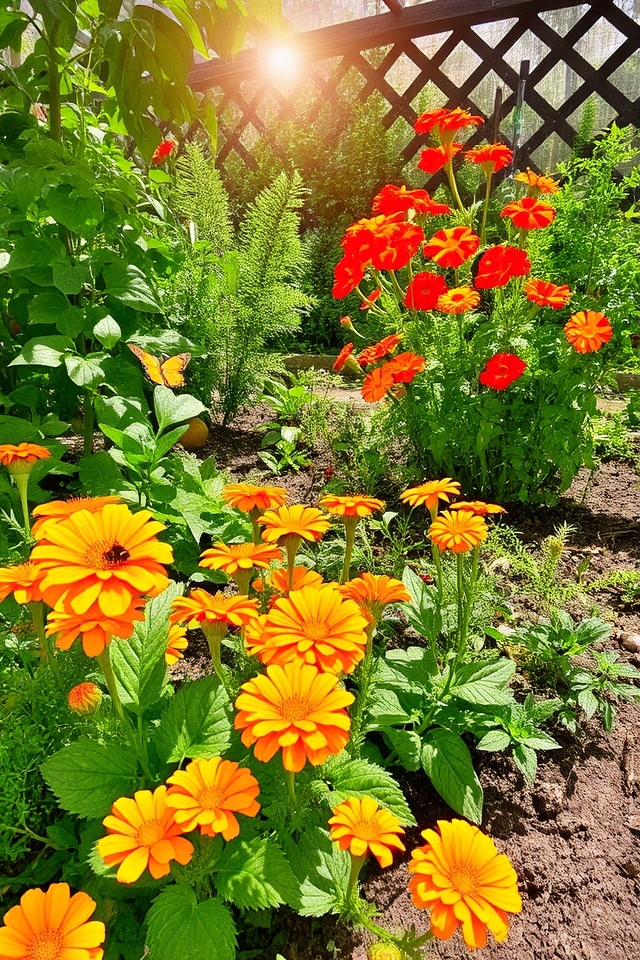
Companion planting is a strategic gardening method where certain plants are grown together to enhance growth, repel pests, and improve flavor. For a flower garden, consider pairing marigolds with vegetable plants to deter aphids and other harmful insects. Alternatively, growing nasturtiums alongside your flowers can attract beneficial pollinators and add vibrant color. By selecting compatible plant combinations, you create a more resilient ecosystem in your garden, fostering healthy blooms and increased biodiversity.
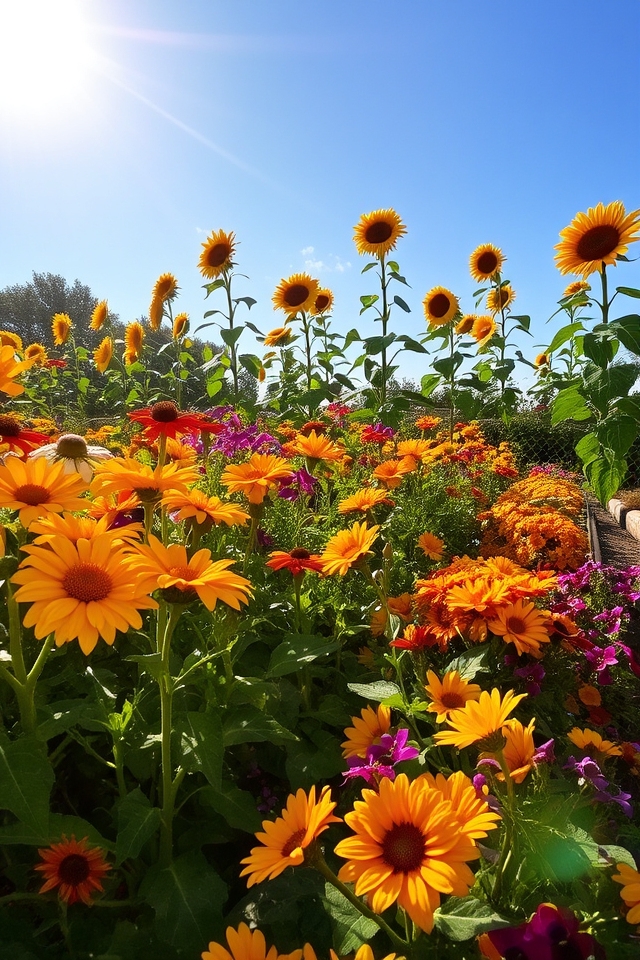
Providing adequate sunlight is essential for the success of your flower garden. Most flowering plants thrive in full sun, meaning they need at least 6 to 8 hours of direct sunlight per day. Assess your garden space to identify sun exposure throughout the day. To enhance growth, consider positioning taller plants on the north side to prevent shading shorter varieties. Regularly monitor and adjust plant placement as necessary to guarantee they receive the light they need to flourish.
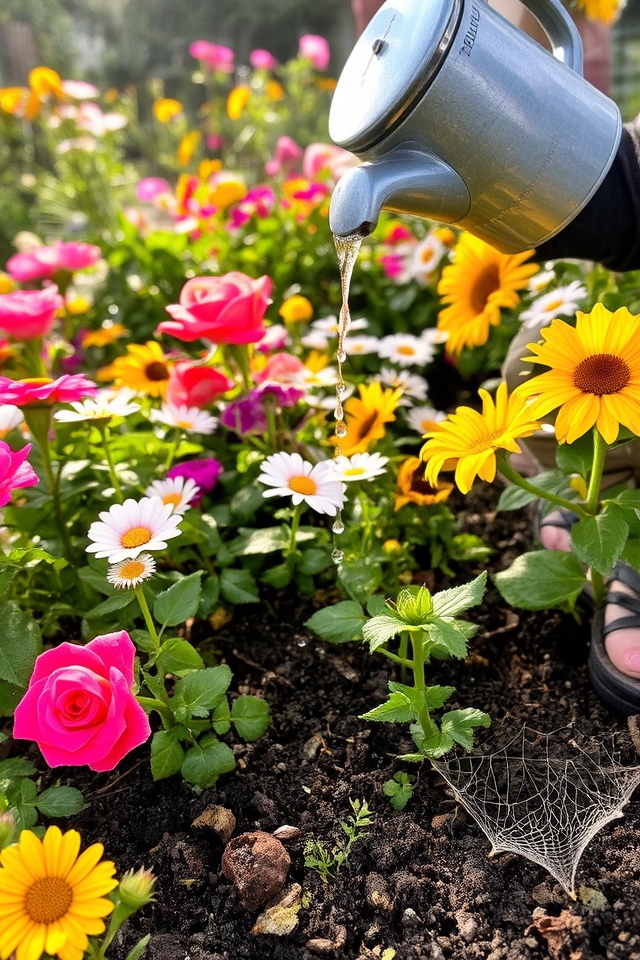
Proper watering is essential for the health and vibrancy of your flower garden. Aim to water early in the morning or late in the afternoon to minimize evaporation. It’s important to provide deep, thorough watering rather than shallow, frequent doses, encouraging roots to grow deeper into the soil. Monitor weather conditions; during hot periods, your flowers may require more water. Always check the soil moisture before watering to avoid overwatering, which can lead to root rot.
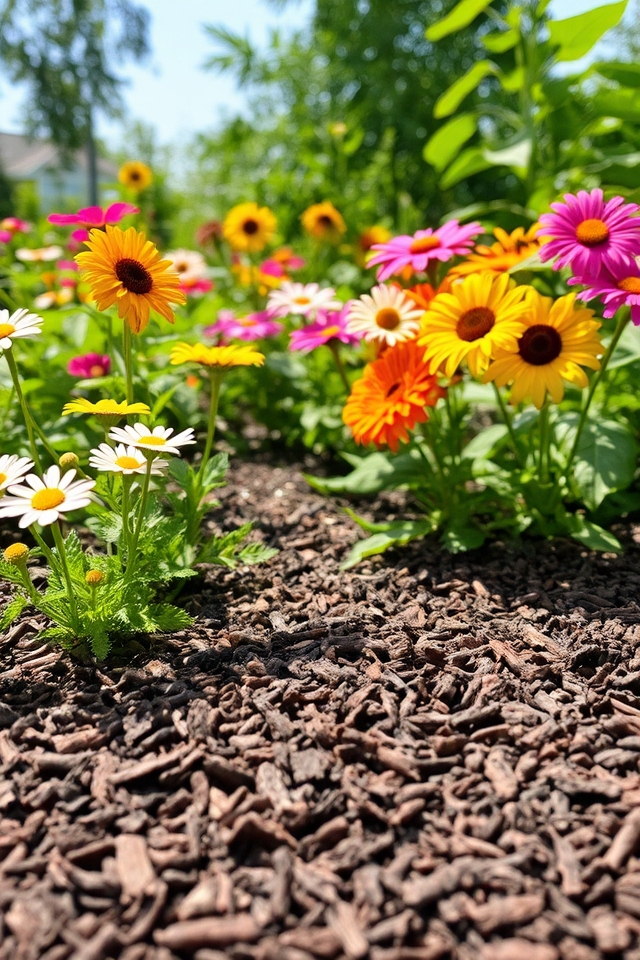
Implementing mulching techniques in your flower garden can greatly enhance plant health and appearance. Mulch serves to retain soil moisture, suppress weeds, and regulate soil temperature, creating an ideal environment for flowers. Organic mulches, like wood chips or straw, break down over time, enriching the soil, while inorganic options, such as pebbles, provide a longer-lasting solution. Apply a 2-3 inch layer around your plants, ensuring to keep it away from stems to prevent rot.
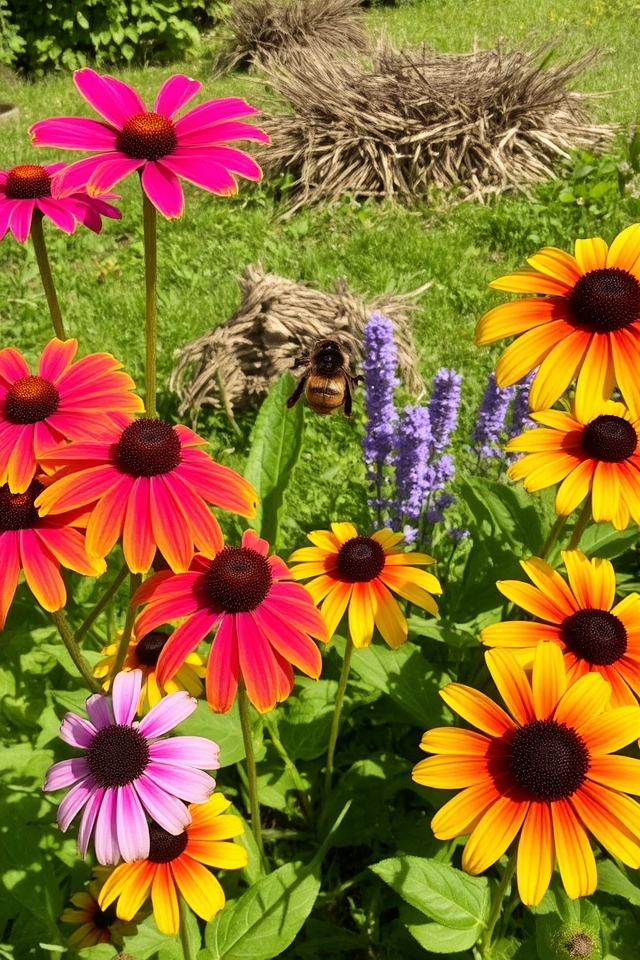
To attract pollinators to your home flower garden, choose a diverse selection of blooming plants that provide nectar and pollen throughout the growing season. Native flowers, such as coneflowers, black-eyed Susans, and bee balm, are particularly effective. Incorporating plants with various shapes, sizes, and colors can cater to different pollinators, including bees, butterflies, and hummingbirds. Avoid pesticides and create shelter with small brush piles or rocks to encourage these beneficial creatures to visit your garden.
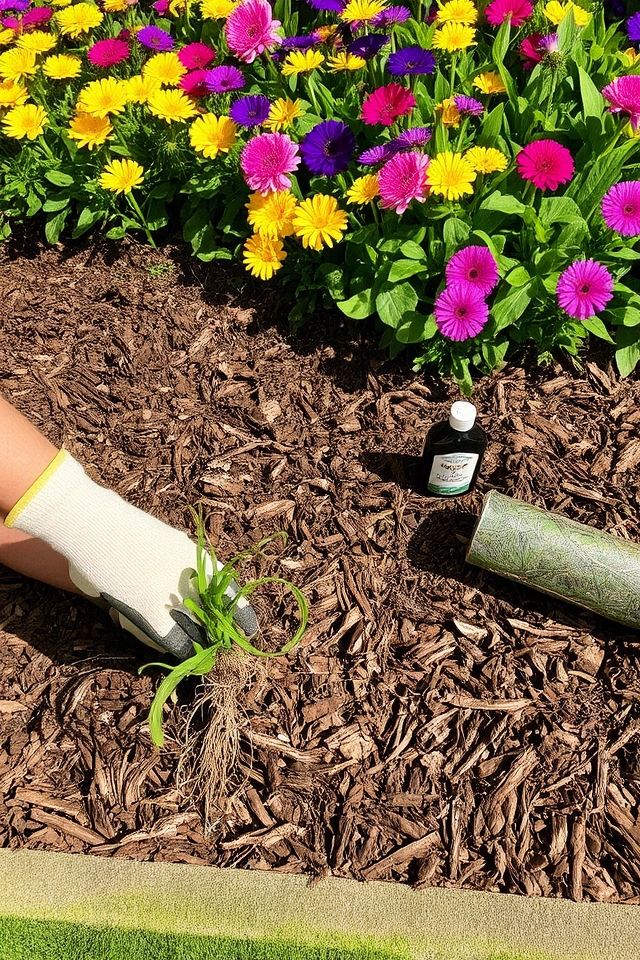
Managing weeds effectively is essential for a flourishing flower garden. Start by regularly monitoring your garden for invasive plants; pulling them out by hand or using a hoe works well when the soil is moist. Applying mulch can suppress weed growth by blocking sunlight and moisture. Additionally, consider using landscape fabric or organic herbicides as preventive measures. Cultivating healthy soil through regular maintenance will also help your flowers thrive while minimizing weed competition.
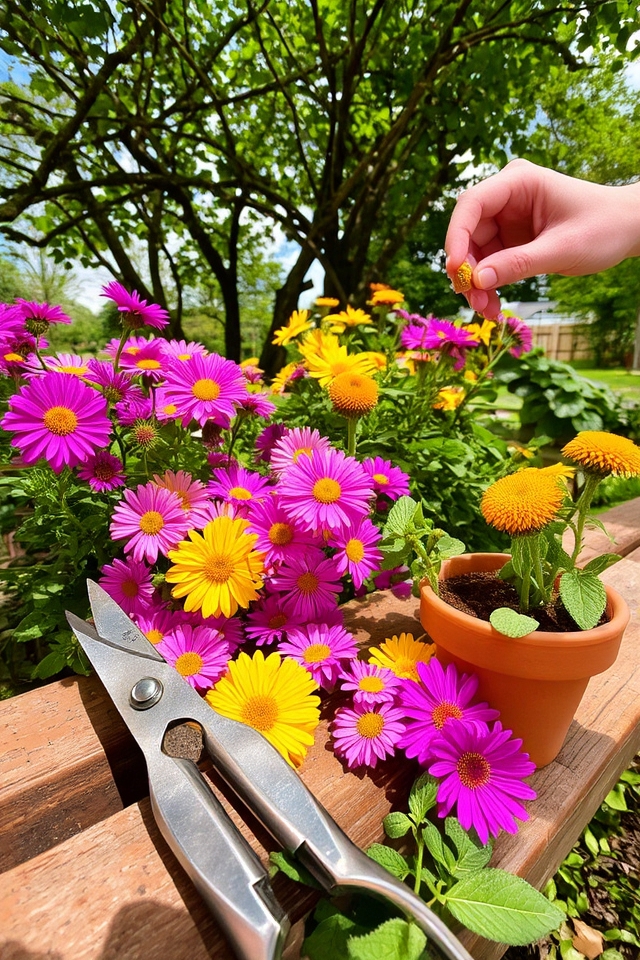
Pruning and deadheading are essential practices for maintaining a vibrant flower garden. Regularly removing dead or wilted blooms encourages plants to focus their energy on producing new flowers and promotes healthy growth. Pruning not only shapes the plants for peak aesthetics but also helps eliminate diseased or overcrowded stems. By keeping up with these tasks, you guarantee a flourishing garden that continuously rewards you with stunning blooms throughout the growing season.
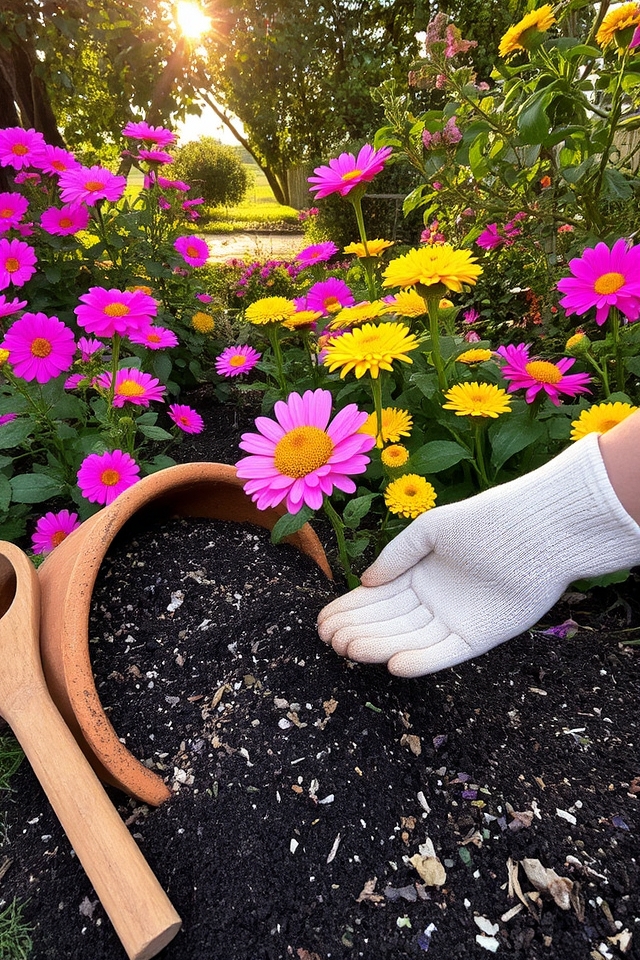
Fertilizing mindfully is essential for nurturing a healthy flower garden. Begin by selecting organic fertilizers that enrich the soil without harming beneficial insects or microorganisms. Apply fertilizers based on the specific needs of your plants—some may require more nitrogen, while others thrive on phosphorous or potassium. It’s important to follow recommended guidelines, as over-fertilizing can lead to nutrient runoff and environmental harm. Regular soil testing can also help you tailor your fertilization strategy effectively.
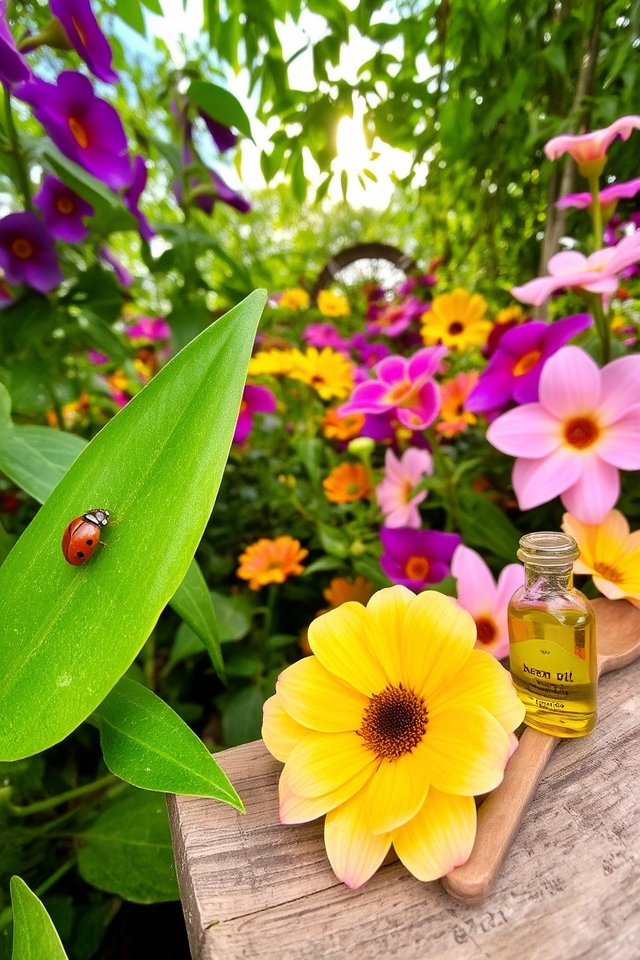
Protecting your flower garden from pests is essential for maintaining the health and beauty of your plants. Start by implementing natural pest control methods, such as introducing beneficial insects like ladybugs and lacewings that prey on harmful pests. Additionally, utilize organic sprays made from neem oil or insecticidal soap to deter unwanted bugs. Regularly inspect your plants for signs of infestations, and promptly remove any affected foliage to prevent the spread of pests throughout your garden.
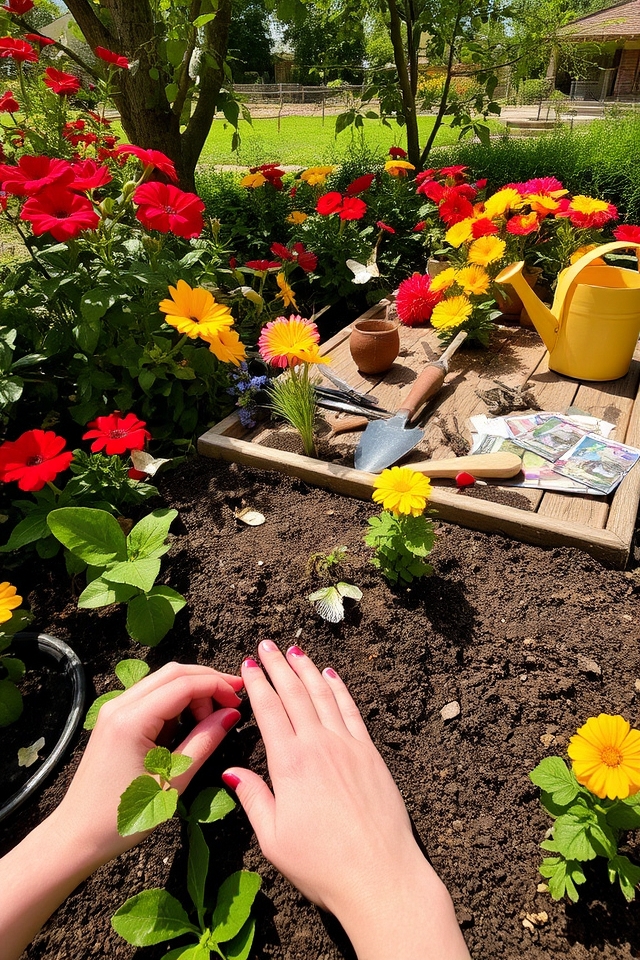
Creating a flower garden is as much about the journey as it is about the final bloom. Embrace the process by savoring each step, from selecting seeds and planning layout to planting and nurturing your flowers. Take time to enjoy the fresh air, the feel of soil between your fingers, and the anticipation of watching your garden grow. Each moment spent in your garden can be a therapeutic escape that connects you more deeply with nature.
Creating your dream flower garden is like crafting a masterpiece; each bloom is a brushstroke on the canvas of your yard. With patience and care, you’ll see your vision take root and flourish. Remember those first vibrant flowers you planted? Just as they brought you joy, nurturing your garden will continue to awaken your passion for nature. So, grab your tools and let your creativity blossom—your personal paradise awaits, bringing beauty and tranquility to your home year after year.

Don't let aphids, slugs, and caterpillars ruin another plant. Take back control with simple, natural methods that actually work.